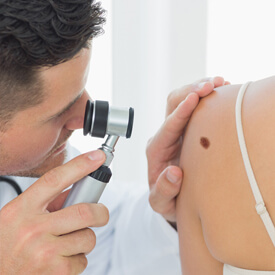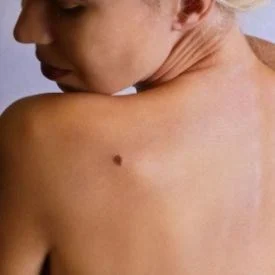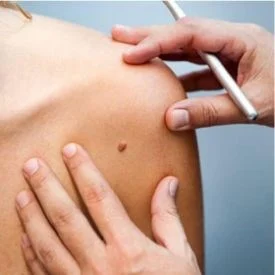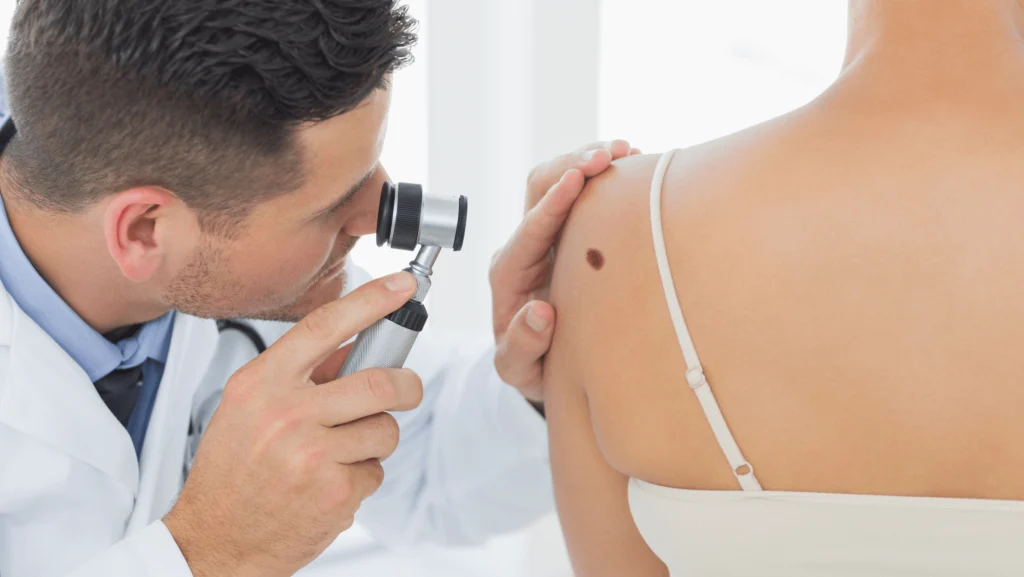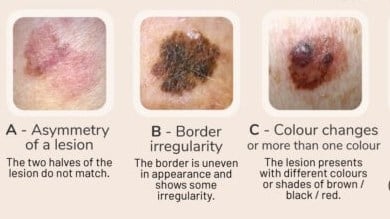What can be done to reduce the risk of developing more skin cancer if they have already had basal or squamous cell skin cancer?
Basal Cell Carcinoma in Fort Washington, PA
ABOUT BCC
The Dermatology and Skin Cancer Institute, led by board-certified dermatologist and Fellowship-trained skin cancer surgeon, Dr. Aradhna Saxena, treats Greater Philadelphia area patients for various forms of skin cancer. Fortunately, many skin cancers can be cured if they are detected and diagnosed early enough. Unfortunately, millions of men and women are affected by basal cell carcinoma (BCC) every year. BCC is virtually always caused by overexposure to UV rays, such as when people spend too much time outdoors without sunscreen, particularly “laying out” or tanning. BCC is also caused by the UV rays emitted by tanning beds.
BCC develops from the bottom (basal) layer of skin cells in the epidermis.
Often, BCC initially looks like a sore or lesion that won’t heal or that heals and then reopens over and over. BCC lesions develop and grow quite slowly, but they can become very wide, deep, and aggressive if left untreated. Early detection of BCC is very important in terms of easy and successful treatment. Dr. David Kasper provides extremely thorough, full-body skin cancer screenings to ensure that he and his patients detect BCC as early as possible.
CAUSES
Patients of practically any age can develop skin cancer, but people who habitually use tanning beds, have suffered several sunburns, or have spent years out in the sun without enough sun protection are at a much greater risk. Fair-skinned individuals with red or blond hair and green or blue eyes are also at an elevated risk. People with the following concerns can also be more prone to developing BCC:
- Previous skin cancer or a family history or skin cancer
- Immunodeficiency disorders or a compromised immune system
- Dermal problems stemming from radiation, excessive scarring, recurring injury, etc.
SYMPTOMS
BCC often presents as new or growing/spreading plaques or bumps that can be painful or sometimes bleed for seemingly no reason. They can be brown or tan, pinkish, dark or bright red, flesh-colored, or white, and they tend to be shiny or pearly. BCC most usually develops on parts of the body with the most sun exposure, such as the face, nose, ears, scalp, neck, and the top of hands; however, it is possible to develop BCC anywhere on the body.
BCC is usually curable, especially if caught early enough, but it must be treated promptly to achieve the best outcome. BCCs grow relatively slowly, but the larger they are allowed to become, the more danger you are in. When BCCs grow deep enough into the skin, muscle and nerve damage can also result.
TREATMENTS
Once Dr. David Kasper, Amy Hahn, PA-C, Charlie Capaci PA-C, or Megan Quinn, PA-C has determined a diagnosis of BCC with a skin biopsy, we will talk with you about the best treatment for your skin cancer. BCC treatments are determined by factors including the size and location of the lesion(s). Some of the most common and effective BCC treatments include topical chemotherapy, cryotherapy, surgical excision, electrodesiccation and curettage (ED&C), and Mohs Micrographic Surgery.
At the Dermatology and Skin Cancer Institute, we are very serious about the detection, treatment, and prevention of skin cancer.
SET UP YOUR BCC SCREENING
At the Dermatology and Skin Cancer Institute, Dr. David Kasper, Amy Hahn, PA-C, Charlie Capaci PA-C, and Megan Quinn, PA-C are devoted to offering individualized care to ensure every patient’s best outcome. If you have been given a skin cancer diagnosis, you require treatment from an experienced, board-certified dermatologist and Fellowship-trained skin cancer specialist like Dr. Aradhna Saxena. If you believe you may have skin cancer, please contact one of our offices in Fort Washington or Lansdale, PA today to schedule your consultation with Dr. Saxena.


